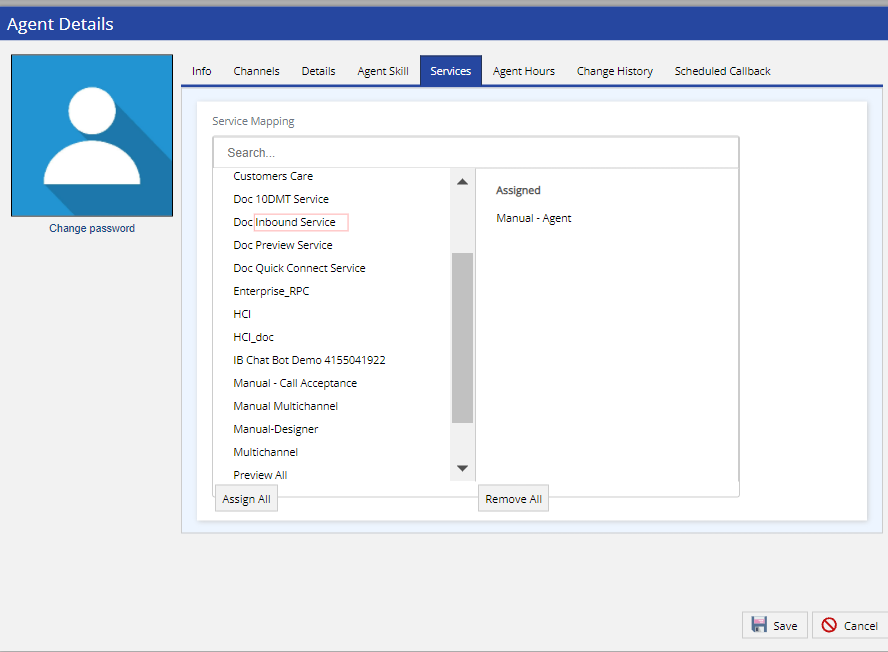LiveVox supports multiple options when routing calls to agents.
-
Inbound Routing: You can route inbound calls to the specific agent who is assigned to an account or to the agent who last spoke to the consumer. This process requires that you enable ANI Lookup and that you can locate a previous transaction with an Agent ID. Automatic Number Identification (ANI) Lookup automatically determines the telephone number of the caller.
The inbound services route and/or blend the incoming calls based on the Contact Flow Engine and the specified routing settings. The Contact Flow Engine is a tool on the LiveVox Portal (LVP) that enables you to define the flow of any type of communication (call, chat, email, SMS, or WhatsApp) between your organization and customers. A contact flow primarily consists of modules (such as languages or actions) and connectors (for linking modules, setting the flow, or assigning system codes). The Contact Flow Engine is used to create messages (in a specific language), which are then assigned to services such as a manual service or an inbound service.
Routing settings, such as Service Groups, Agent Teams, and Agent Skills, allow you to blend and route calls to specific agents logged in to the LiveVox Portal. The blending feature increases agent efficiency by enabling agents to work outbound campaigns and handle the generated inbound traffic simultaneously. - Outbound Routing: You can route outbound calls to specific agents if the Agent ID is provided in the input file (this value must match the Agent ID on LVP). An input file contains customer data, such as name and account number.
-
Service-based Routing (SBR): SBR is a call assignment strategy used to route calls to the most suitable agent based on the agent's skills. For example, if a call is classified as Spanish, the SBR attempts to route the call to a Spanish-speaking agent.
Example: Routing Inbound Calls to an Agent
Inbound routing tools and options allow you to control the level of inbound blending. Call blending happens when agents receive calls from an inbound or outbound service they are not signed in to while simultaneously participating in outbound campaigns on their service.
Phone numbers are associated with inbound services for routing purposes. To route calls to an agent, you must assign the required service type when you create the agent's profile.
- On the LiveVox Portal (LVP), on the Configure tab, click Agents > Agents.
The Agents window appears. - On the General tab, click ADD.
The Agent Details window appears. - On the Info tab, enter the basic information about the agent.
- On the Channels and Agent Skill tabs, specify values in the required fields.
- To assign inbound services to the agent, on the Services tab, in the Available section, select Inbound Service, and then click Save.

Preferred Routing
The Preferred Routing feature specifies the routing method and the overall routing framework.
- Service Routing: Displays the agents associated with the inbound or outbound service. These are the agents who log in to the service directly.
- Service Group Routing: Displays the service group with which the inbound or outbound service is associated, as well as the agents associated with these services. Additionally, displays the Service Group Routing Type for the target service group.
- Agent Teams Routing: Displays the agent teams assigned to the service, as well as the agents that belong to the assigned agent teams. Additionally, displays the Agent Team Routing Type for the target agent team.
Agent Skills
The Agent Skills feature allows you to classify agents for preferential routing of inbound or outbound traffic based on an attribute the agents possess, the type of clients they handle, or their proficiency (level of expertise) in handling certain calls. For example, you can assign skills based on multi-language capabilities or strong collection experience and link them to accounts that require these qualifications. The logic that specifies which accounts or calls use a given skill is defined at the message level and is applied based on the service group type of the service contributing to the call traffic.
Contact Flows
You can design individual or custom contact flows to meet specific routing needs and options. For more information, see Contact Flow.